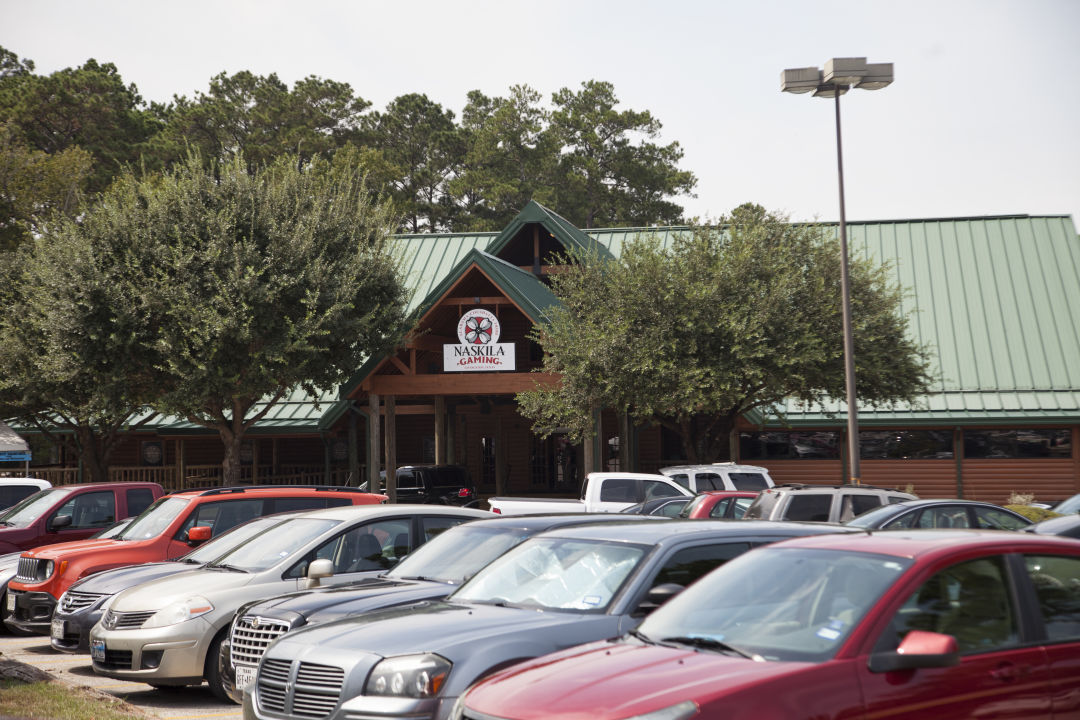Alabama Coushatta Casino Livingston Texas
Ruling could close popular bingo hall near Woodville (The Beaumont Enterprise February 7, 2018) Alabama-Coushatta Tribe back in court to defend modest casino (May 11, 2017)
The Coushatta began to live with the Alabama on their reservation. Both the peoples struggled after the Civil War, as few spoke English and they had difficulty finding jobs. They acquired more land and today their reservation is 4,593 acres large, located 17 miles east of Livingston, Texas. About half the tribe, or 500 people, live on the. The tribe's reservation is in Livingston, Texas. At the time of the letter, Abramoff was working for the Louisiana Coushatta and had portrayed the Alabama-Coushatta's Houston-area casino as a.
Alabama-Coushatta Tribe faces legal fight over modest casino (October 25, 2016)
Get directions, reviews and information for ALABAMA COUSHATTA ONESTOP in Livingston, TX. ALABAMA COUSHATTA ONESTOP 5701 US Highway 190 W Livingston TX 77351. The Alabama-Coushatta Indian Reservation Campground is an out of the way oasis in the middle of the Big Thicket of East Texas. Lots of tall pine trees throughout the campground. Lake Tombigbee (manmade) has fishing, swimming and boat rentals as well to paddle around. Hiking trails throughout, close to Big Thicket trails and activities. In Texas, there are 41 cases per 1,000 people, but for the Alabama-Coushatta, the number is about 52 cases per thousand. The Native American population in El Paso County, where the Ysleta Del Sur Pueblo is located, has had 71 cases total.
Alabama-Coushatta Tribe shares economic impact of new casino (September 19, 2016)
Alabama-Coushatta Tribe back in court to defend gaming rights (August 17, 2016)
| Total population | |
|---|---|
| Coushatta Tribe of Louisiana 910 enrolled members Alabama-Coushatta Tribe of Texas 380 enrolled | |
| Regions with significant populations | |
| United States (Louisiana, Texas, Oklahoma) | |
| Languages | |
| English, Spanish, French, Koasati language | |
| Religion | |
| Christianity | |
| Related ethnic groups | |
| Alabama, other Muscogee peoples |
The Coushatta (Koasati: Koasati, Kowassaati or Kowassa:ti) are a Muskogean-speaking Native American people now living primarily in the U.S. states of Louisiana, Oklahoma, and Texas.
When first encountered by Europeans, they lived in the territory of present-day Tennessee, Georgia and Alabama. They were historically closely allied and intermarried with the Alabama people, also members of the Creek Confederacy. Their languages are closely related and mutually intelligible.
Under pressure from Anglo-American colonial settlement after 1763 and the French defeat in the Seven Years' War, they began to move west into Mississippi, Louisiana and Texas, which were then under Spanish rule. They became settled in these areas by the early 19th century. Some of the Coushatta and Alabama people were removed west to Indian Territory (now Oklahoma) in the 1830s under Indian Removal, together with other Muscogee (Creek) peoples.
Today, Coushatta people are enrolled in three federally recognized tribes:

- Alabama-Quassarte Tribal Town in Wetumka, Oklahoma
- Coushatta Tribe of Louisiana.
Language[edit]
The Koasati language is part of the Apalachee-Alabama-Koasati branch of the Muskogean languages. An estimated 200 people spoke the language in 2000, most of whom lived in Louisiana. The language is written in the Latin script.[1]
History[edit]
The Coushatta were traditionally agriculturalists, growing a variety of maize, beans, and squash, and supplementing their diet by hunting game and fish. They are known for their skill at basketry. Nearly all the Spanish expeditions (including the 1539-1543 Hernando de Soto Expedition) into the interior of Spanish Florida recorded encountering the original town of the tribe.[2] It was believed to be located in the Tennessee River Valley. (Click here for a list of towns encountered by the Hernando de Soto Expedition.) The Spanish referred to the people as Coste, with their nearby neighbors being the Chiaha, Chiska, Yuchi, Tasquiqui, and Tali.
Under pressure from new European settlers in the 17th-18th centuries, the Coushatta made treaties and ceded land, and they migrated west into present-day Alabama. Along the way they established their town at Nickajack (Ani-Kusati-yi, or Koasati-place, in Cherokee) in the current Marion County, Tennessee. Later they founded a major settlement at the north end of Long Island, which is bisected by the present-day Tennessee-Alabama stateline.
By the time of the American Revolution, the Coushatta had moved many miles down the Tennessee River where their town is recorded as Coosada. In the 18th century, some of the Coushatta (Koasati) joined the emerging Creek Confederacy, where they became known as part of the 'Upper Creek'. They were closely related to the Alabama Indians and often intermarried with them. Coushatta and Alabama who stayed in Alabama were part of the 1830s forcible removal to Indian Territory west of the Mississippi River. Today their descendants form the federally recognized Alabama-Quassarte Tribal Town in Wetumka, Oklahoma
Some of the Coushatta tribe split from the Creek Confederacy and went to South Louisiana. Their descendants today make up the federally recognized Coushatta Tribe of Louisiana.
Notable chiefs among the Coushatta-Alabama were Long King and Colita (Koasati) (1838-1852), who succeeded him. They led their people to settle in present-day Polk County, Texas in the late 18th and early 19th centuries. Colita's Village was developed prior to the European-American settlement of Livingston, Texas.[3] Descendants of these peoples form the federally recognized Alabama-Coushatta Tribe of Texas and have a reservation near Livingston.
Ethnobotany[edit]
A decoction of the leaves of Pseudognaphalium obtusifolium ssp. obtusifolium is used for fevers. The Coushatta use it to bathe those who are feverish.[4]
Alabama Coushatta Casino Livingston Texas
20th century to present[edit]
- The Alabama-Quassarte Tribal Town in Wetumka, Oklahoma achieved federal recognition in 1939, following passage of the Oklahoma Indian Welfare Act of 1936. Its people were descendants of a community that had moved as a group from their town in Alabama to Indian Territory in the 1830s. They settled together and maintained their town identity. In addition, its people have dual citizenship in the federally recognized Muscogee Creek Nation, representing descendants of the broader Creek Confederacy. It has an enrolled population of 380.
- In 1972, the Coushatta Tribe of Louisiana achieved state recognition as a tribe. A year later it gained federal recognition. The tribe has acquired 685 acres (2.77 km2) of reservation near its traditional homeland of the 18th and 19th centuries. This land is held in trust on the tribe's behalf by the United States Department of the Interior.[5]
In the twentieth century, the Coushatta people in Louisiana began cultivating rice and crawfish on tribally owned farms on the reservation, where most of the current population resides. An estimated 200 people of the tribe still speak the Coushatta language, which is in the Muskogean family. In the early 21st century, fewer young people are learning it and the tribe is working on language preservation.
Since the late 20th century and the rise in Indian self-determination, many Native American tribes have developed a new source of revenues by establishing gaming casinos on their reservations, which are sovereign territory. States, which had begun their own gaming operations and regulated private ones, and the federal government have passed legislation to control Indian gaming, which must conform to what exists by state law. While such revenues are not taxable by the states, tribes often negotiate agreements with the states to share some portion of income, in recognition of their reliance on state infrastructure and other assets. In the 1990s, the Coushatta of Louisiana hired the lobbyistJack Abramoff to assist in establishing a gaming casino on their reservation. They were victims of his manipulations, as he charged them high fees but did not work on their behalf to gain federal or state approval of such development. He was ultimately prosecuted for his actions.
Alabama Coushatta Casino Livingston Texas Reviews
Since then, the tribe has established gaming on its reservation. It also has tax-free sales of certain items to raise revenues. The initiatives have raised significant revenues, but the state filed suit to stop the specific class of gaming. Litigation is underway.
F. A. Little, Jr., of Alexandria, Louisiana, a retired United States District Judge for the Western District of Louisiana, serves as chief judge for the tribe.[6]
- The Alabama-Coushatta Tribe of Texas achieved federal recognition in 1987. It has acquired a 4,600-acre (19 km2) reservation near Livingston, Texas, its homeland since settling in this area in the early 19th century. It has 1,100 enrolled members.
References[edit]

- ^'Koasati', Ethnologue. Retrieved 27 May 2013.
- ^Hudson, Charles M. (1997). Knights of Spain, Warriors of the Sun. University of Georgia Press.
- ^'Alabama-Coushatta Indians', Texas Handbook Online
- ^Taylor, Linda Averill. (1940) Plants Used As Curatives by Certain Southeastern Tribes. Cambridge, MA. Botanical Museum of Harvard University (p. 61)
- ^Coushatta Tribe of LouisianaArchived 2007-07-10 at the Wayback Machine, accessed 25 Apr 2010
- ^'F. A. Little, Jr. (Ret.)'. Federal Arbitration. Archived from the original on April 14, 2012. Retrieved April 6, 2012.
External links[edit]
| Wikimedia Commons has media related to Koasati. |

- Alabama-Quassarte Tribal Town, official site
- Alabama-Coushatta Tribe of Texas, official site
- Coushatta Tribe of Louisiana, official site